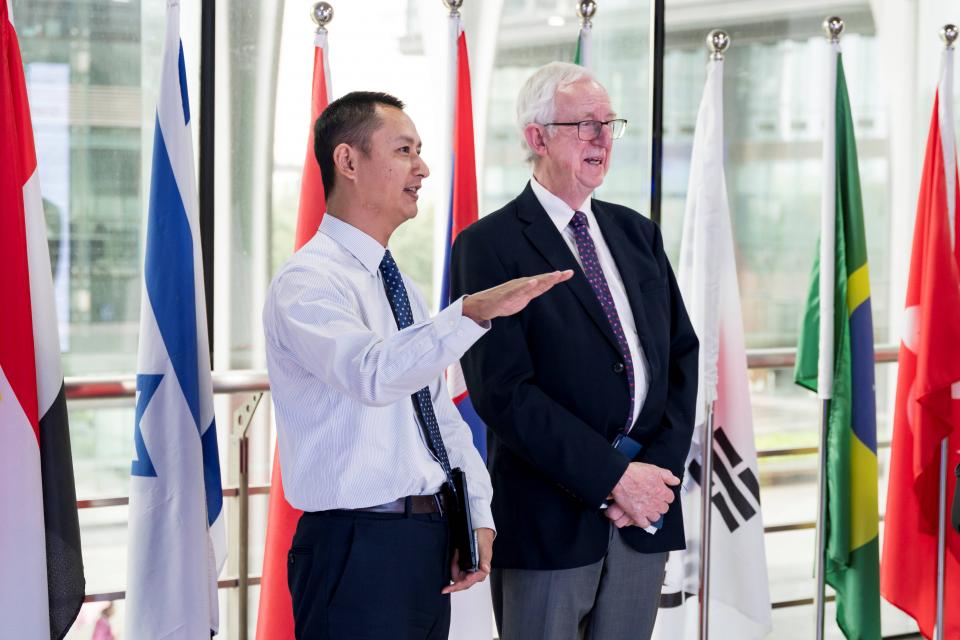The arrival of the world’s largest technology park developer here is set to boost scientific research infrastructure and support business growth through the commercialisation of innovations in the bioscience, agritech and healthcare sectors.
Chinese owned Tus-Holdings, manages international assets of $48bn, operates 300 start-up incubators in 70 science parks in 100 cities around the world. The organisation has also partnered with over 200 tertiary education providers, including Cambridge University, to support the growth of thousands of companies over the past 30 years.
A newly signed memorandum of understanding, signed by the company and New Zealand’s former ambassador to China in his current role as chairman of the Council of Next Federation, Tony Browne, could lead to a multi-million dollar local incubation facility established to help Kiwi food, health and other technology businesses access the Chinese market.
As part of the agreement, Tus-Holdings will explore the joint construction of science and technology industrial parks in New Zealand, Australia and China to promote and commercialise innovation.
Browne says if established, the development of a new technology park here, similar to the Cambridge University facility, could represent a significant opportunity for the expansion of New Zealand’s science and tech sectors.
He says the company has a focus on the provision of facilities and opportunities for scientific research and its commercialisation.
Browne says the potential benefits for New Zealand lie in the development of new research facilities, enhanced international connections, and the chance for startups and other companies to benefit from networks and guidance in developing and growing science-based initiatives.
“Through its incubation and funding ecosystem, Tus-Holdings has helped thousands of fledgling tech companies, including 94 listed companies, develop from startup phase to reach their full potential.
“The potential launch of a science and technology park in New Zealand, similar to what has been developed in countries such as the UK, US and Switzerland, would be designed to provide critical investment to help Kiwi firms commercialise their ideas and build sufficient scale to access key offshore markets.
“The TusPark Cambridge facility has successfully helped British companies enter and grow within the Chinese market, and it is hoped that this model could yield similar outcomes if introduced here,” he says.
TusPark Cambridge is a 40,000 sqm facility and represents the largest development project and the first science park partnership in the 472-year history of the British university.
The facility has already attracted a diverse range of organisations including biotechnology, software and gaming companies.
A delegation from TUS-Holdings, led by executive vice president Chen Hongbo, who is also president of the Spanish-headquartered International Association of Science Parks and Areas of Innovation, will arrive in NZ this month as part of an upcoming global trade summit in Auckland.
A number of the country’s healthcare organisations and largest food exporters including principal partner Fonterra, Rockit and Keraplast have also confirmed they will use the event, High 5 New Zealand International Health Industry Summit, to promote their products to foreign government representatives and buyers from countries with a population of over 1.6 billion.
The event is also set to attract representatives from Government agencies from around Asia which are key to the facilitation of trade with New Zealand businesses.
The international agencies sending delegations include Indonesia’s National Research and Innovation Agency - which facilitates access for the country’s 270 million residents to new tech products and the Ministry of Industry and Information Technology of China - including the Departments of Energy-Saving Equipment and, Consumer Goods Industry which covers many of New Zealand’s bulk raw material suppliers such as milk powder, butter and dairy.
A delegation from the China Institute of Food and Fermentation, which is responsible for formulating China's national standards in the fields of food (including functional foods), beverages, wine and other fields, and has close relations with New Zealand suppliers and exporters, will also attend.
Connections with key decision makers
William Zhao, former CEO of Yashili Dairy Plant in the Waikato and current Next Federation executive chairperson, says the event will offer Kiwi exporters the opportunity to connect with key international decision makers on their home soil.
“Accessing offshore markets, particularly those that are highly regulated and complex can be challenging for New Zealand businesses.
“One of the key benefits of the upcoming event will be the ability for Kiwi exporters to showcase their brands in their native environment and interact with government decision makers who are keen to learn more about what the country has to offer,” he says.
The High 5 New Zealand International Health Industry Summit and Trade Event will be held in Auckland on 24 November 2023 at the Due Drop Event Centre. A gala awards ceremony for the global health sector will precede the event.
Photo above: Tony Browne and Yang Ming, the board secretary of TUS who signed the MOU on behalf of TUS.


